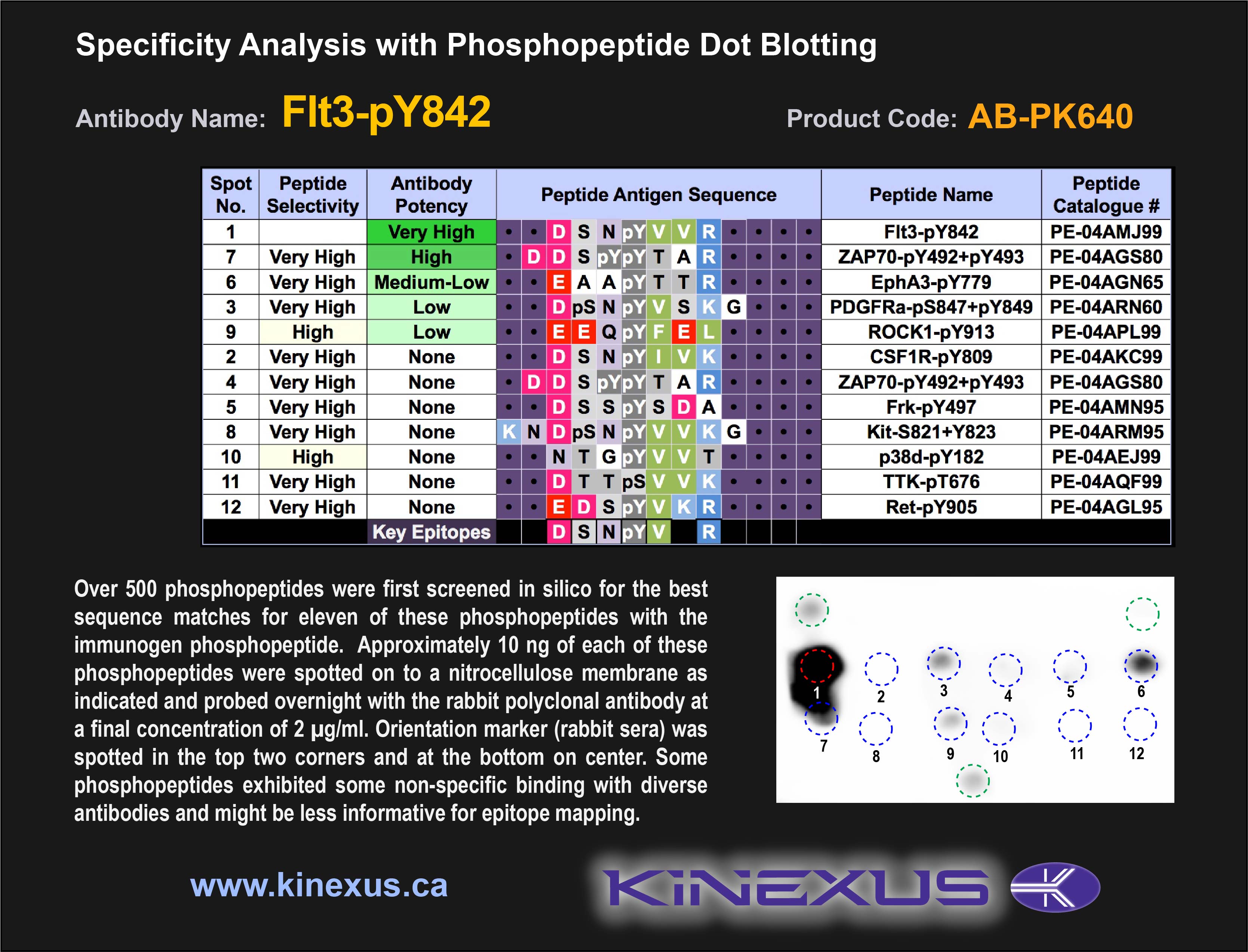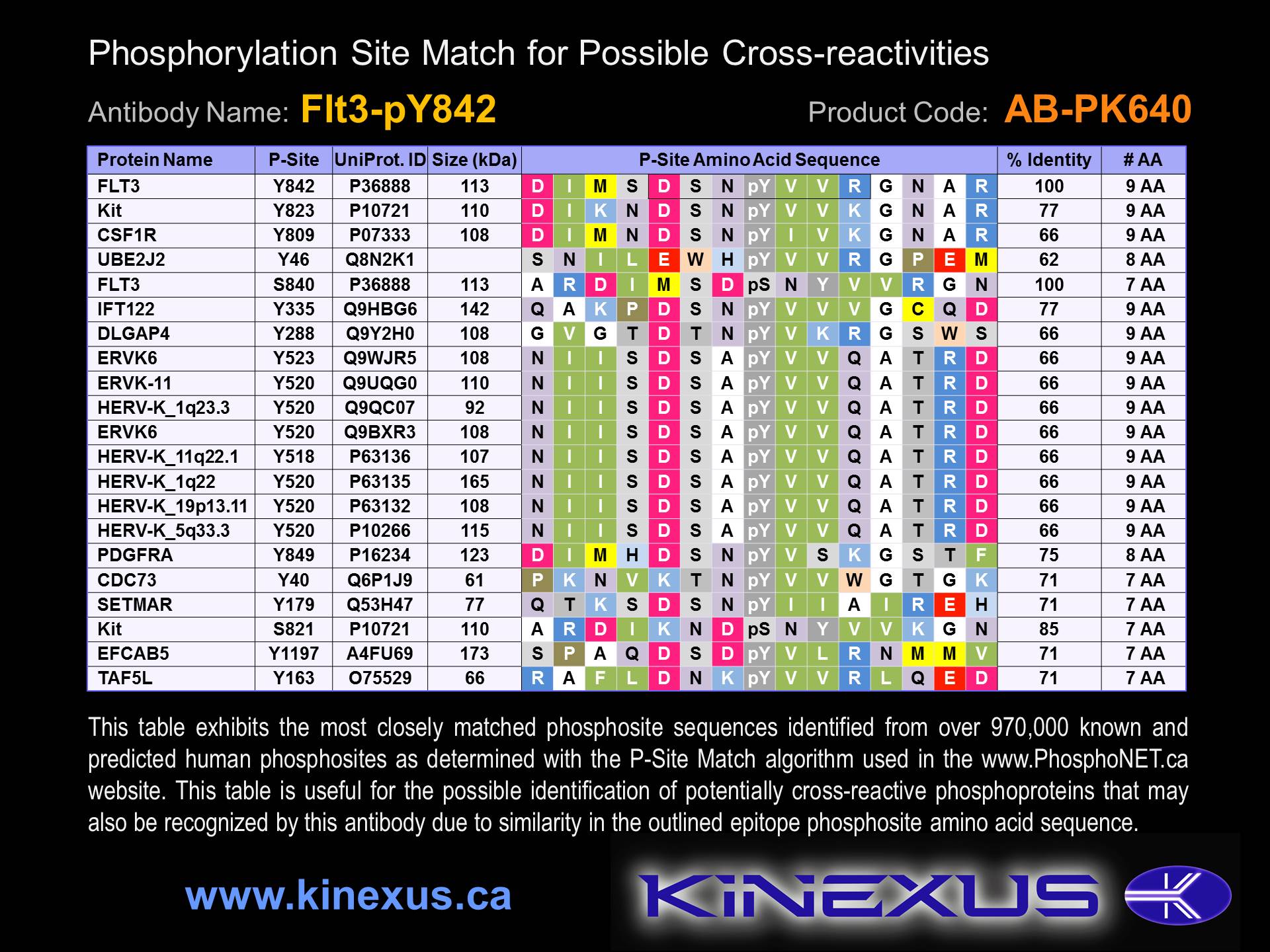Product Name: Flt3-pY842
Product Number: AB-PK640
| Size: | 25 µg | Price: | 89.00 | |
| $US |
Target Full Name: Fetal liver fms-related tyrosine kinase 3; Receptor-type tyrosine-protein kinase FLT3
Target Alias: CD135; Fetal liver kinase 2; FL cytokine receptor; FLK2; FLK-2; FLT-3; Fms-related tyrosine kinase 3; Kinase Flt3; STK-1; RP11-153M24_3; CD135; STK1; FLK2; ENSG00000122025
Product Type Specific: Protein kinase phosphosite-specific antibody
Antibody Code: PK640
Antibody Target Type: Phosphosite-specific
Antibody Phosphosite: Y842
Protein UniProt: P36888
Protein SigNET: P36888
Antibody Type: Polyclonal
Antibody Host Species: Rabbit
Target Alias: CD135; Fetal liver kinase 2; FL cytokine receptor; FLK2; FLK-2; FLT-3; Fms-related tyrosine kinase 3; Kinase Flt3; STK-1; RP11-153M24_3; CD135; STK1; FLK2; ENSG00000122025
Product Type Specific: Protein kinase phosphosite-specific antibody
Antibody Code: PK640
Antibody Target Type: Phosphosite-specific
Antibody Phosphosite: Y842
Protein UniProt: P36888
Protein SigNET: P36888
Antibody Type: Polyclonal
Antibody Host Species: Rabbit
Antibody Immunogen Source: Human Flt3 (STK1) sequence peptide Cat. No.: PE-04AMJ99
Antibody Immunogen Sequence: DSN(pY)VVR(bA)C
Antibody Immunogen Description: Corresponds to amino acid residues D839 to R845; In the protein kinase catalytic domain activation T loop region between subdomains VII and VIII.
Antibody Immunogen Sequence: DSN(pY)VVR(bA)C
Antibody Immunogen Description: Corresponds to amino acid residues D839 to R845; In the protein kinase catalytic domain activation T loop region between subdomains VII and VIII.
Production Method: The immunizing peptide was produced by solid phase synthesis on a multipep peptide synthesizer and purified by reverse-phase hplc chromatography. Purity was assessed by analytical hplc and the amino acid sequence confirmed by mass spectrometry analysis. This peptide was coupled to KLH prior to immunization into rabbits. New Zealand White rabbits were subcutaneously injected with KLH-coupled immunizing peptide every 4 weeks for 4 months. The sera from these animals was applied onto an agarose column to which the immunogen peptide was thio-linked. Antibody was eluted from the column with 0.1 M glycine, pH 2.5. Subsequently, the antibody solution was neutralized to pH 7.0 with saturated Tris.This antibody was also subject to negative purification over phosphotyrosine-agarose.
Antibody Modification: Unconjugated. Contact KInexus if you are interest in having the antibody biotinylated or coupled with fluorescent dyes.
Antibody Modification: Unconjugated. Contact KInexus if you are interest in having the antibody biotinylated or coupled with fluorescent dyes.
Antibody Concentration: 1.0 mg/ml
Storage Buffer: Phosphate buffered saline pH 7.4, 0.05% Thimerasol
Storage Conditions: For long term storage, keep frozen at -40°C or lower. Stock solution can be kept at +4°C for more than 3 months. Avoid repeated freeze-thaw cycles.
Product Use: Western blotting | Antibody microarray
Antibody Potency: Very strong immunoreactivity with immunogen peptide on dot blots. Medium immunoreactivity with recombinant human Flt3 on protein dot blots.
Antibody Species Reactivity: Human
Antibody Positive Control: The observed molecular masses of the processed target protein on SDS-PAGE gels are reported to be around 120-130 and 165-175 kDa.
Storage Buffer: Phosphate buffered saline pH 7.4, 0.05% Thimerasol
Storage Conditions: For long term storage, keep frozen at -40°C or lower. Stock solution can be kept at +4°C for more than 3 months. Avoid repeated freeze-thaw cycles.
Product Use: Western blotting | Antibody microarray
Antibody Potency: Very strong immunoreactivity with immunogen peptide on dot blots. Medium immunoreactivity with recombinant human Flt3 on protein dot blots.
Antibody Species Reactivity: Human
Antibody Positive Control: The observed molecular masses of the processed target protein on SDS-PAGE gels are reported to be around 120-130 and 165-175 kDa.
Antibody Cross Reactivity: Medium immunoreactivity on protein dot blots with recombinant human Kit and weaker immunoreactivity with CSF1R. In MCF7 cells not harvested with SDS, no significant cross-reactivities were evident. Following homogenization in SDS-PAGE sample buffer, five cross-reactive proteins were evident in EGF-treated A431 cells, five cross-reactive proteins were noted in insulin-treated MCF7 cells, and five cross-reactive proteins were observed in phenylarsine oxide (PAO)+vanadate-treated HeLa cells.
Related Product 1: Flt3-pY842 blocking peptide
Related Product 1: Flt3-pY842 blocking peptide
Scientific Background: Flt3 (FLK2) is a protein-tyrosine kinase of the TK group and PDGFR family. It is involved in cell proliferation, differentiation and survival through the binding of its ligand, Flt3LG. Autophosphorylation of Y591 increases phosphotransferase activity. Autophosphorylation of Y599 increases phosphotransferase activity and induces interaction with PTPN11/SHP2. and Src. STAT5A activation involves Y589 and Y591 phosphorylation. Flt3 will induce phosphorylation of Shc1 and Akt1 leading to a change in the downstream regulator mTOR. It can activate the Ras signalling pathway and lead to phosphorylation of downstream kinases such as MAPK1/ERK2 and MAPK3/ERK1. Mutations causing constitutive activity promote cell proliferation and resistance to apoptosis. Defects have been associated with acute myelogenous leukemia. Cancer-related mutations in human tumours point to a gain of function of the protein kinase. Insertional mutagenesis studies in mice support a role for this protein kinase in mouse cancer oncogenesis.
Figure 1. Epitope mapping of Flt3-pY842 antibody with similar phosphopeptides on dot blots.
Figure 2. Identification of phosphosites related to Flt3-pY842.
© Kinexus Bioinformatics Corporation 2017



